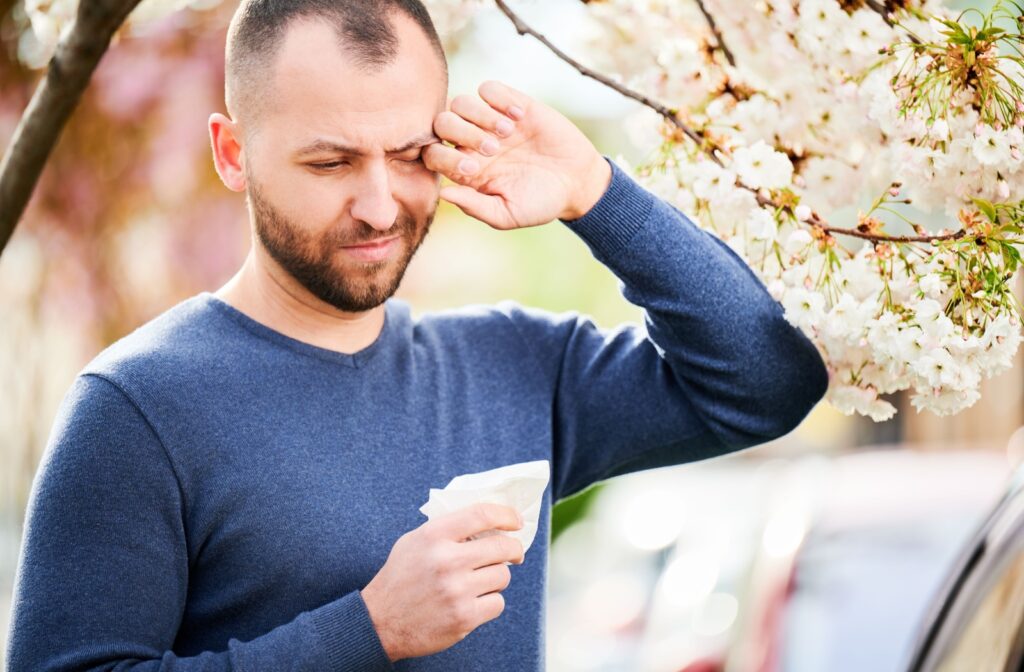Eye irritation is common, but it’s not always easy to figure out what’s causing it. You may notice redness, wateriness, and overall discomfort.
Dry eye and allergies can both cause irritation and discomfort, but they have distinct causes and treatments. Dry eye is caused by an imbalance in the tear film, while allergies are a reaction to an external source.
What Is Dry Eye?
Your tear film has three layers:
- The oily layer, which prevents tears from evaporating
- The watery layer, which keeps the eyes moist
- The mucus layer, which helps the tear film stick to the eye
A balanced tear film helps coat and protect the surface of your eyes from infection and irritants. Dry eye occurs when this balance is disrupted, and the tear film can’t sufficiently protect the eyes.
Factors like age, environmental conditions, diet, and underlying health issues can contribute to dry eye.
Dry eye tends to occur in 2 different forms:
- Aqueous deficiency dry eye, which occurs when the eyes don’t produce enough tears due to a lack of water.
- Evaporative dry eye, which occurs when tears evaporate too quickly due to issues with tear quality and low oils.
Both types lead to a lack of protection and leave the eyes vulnerable.
Common Signs & Symptoms of Dry Eye
Dry eye often showcases itself through irritation and dry sensations. If you’ve experienced any of these symptoms, dry eye might be the culprit:
- Burning sensation
- Gritty or scratchy sensation
- Redness
- Sensitivity to light
- Blurred vision
Sometimes dry eye causes wateriness, which is the eye’s natural response to the irritation.
Dry eye can impact your vision and eye health. If your symptoms persist, it’s time to talk to your optometrist to determine suitable treatments.
Do Allergies Affect The Eyes?
An allergic reaction happens when your immune system responds to a harmless trigger as though it’s an actual threat.
These triggers, or allergens, set off a response that affects multiple parts of the body. Some common allergens include:
- Pollen
- Dust and debris
- Pet dander
- Mold spores
Because your eyes are sensitive, allergic reactions can quickly affect them. When allergens come into contact with the eyes, the immune system can overreact, often causing noticeable irritation and discomfort. This is why many people associate seasonal allergies or exposure to certain allergens with bothersome eye symptoms.
Common Signs Of An Allergic Reaction
For many people, allergies can cause sneezing, an itchy throat, and a runny nose. When allergens reach the eyes, they can set off symptoms like:
- Redness
- Itching, which can feel persistent and hard to ignore
- Swelling or puffiness around the eyes
- Watery eyes
These may occur seasonally or only when exposed to specific triggers. This makes it difficult to identify what’s setting off your symptoms in the first place. If you’re aware of any allergies you have, it’s crucial to take preventive measures and avoid them where possible.
How to Tell the Difference Between Dry Eye & Allergies
Dry eyes and allergic reactions have symptoms that overlap in many ways. However, you can usually look at a few factors to determine what’s causing your irritation:
- Dry eye often causes a gritty or burning sensation, while allergies can cause itching and swelling.
- Dry eye symptoms can persist year-round, while allergy symptoms come and go depending on the season or environment.
- Dry eye tends to worsen when you’re in a harsher environment, like a particularly dry or windy area.
- Allergic reactions can often be accompanied by systemic reactions like sneezing, nasal congestion, or a runny nose.

If you constantly deal with discomfort and eye irritation, your first step should be to visit your optometrist. They can evaluate your symptoms, perform tests if needed, and recommend the right treatment plan depending on their diagnosis.
Find Relief From Your Discomfort
Eye discomfort doesn’t have to disrupt your life. You can find relief from your symptoms and enjoy comfortable vision once more. Visit our team at West Valley Dry Eye to find a personalized treatment plan designed to tackle your discomfort at the source.
You deserve relief, and we know how to help. Book an appointment with us today!


